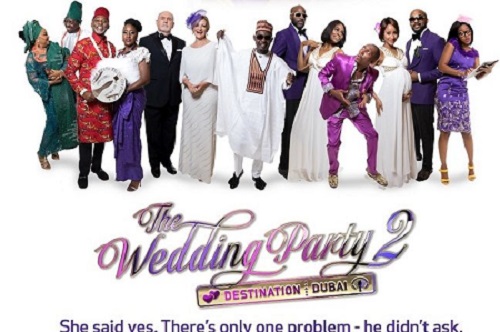Hot Stories
Recent Stories
Check Out The Best Nollywood Movies Of 2017
Posted by Victor on Sat 30th Dec, 2017 - tori.ngOnly Nollywood films that had major cinema releases, or were premiered during the calendar year were considered for this list. Ranked in ascending order. From romantic comedies to twisty thrillers, we summarize the year in film.

10. The Wedding Party 2: Destination Dubai
The sequel to Nollywood’s biggest film delivers exactly what it promises, no more no less. It isn’t better than it has a right to be, and no worse than it could have been. The entire gang returns for another romp of escapism and jolly good fun. Niyi Akinmolayan grabs the helm and delivers a sequel that knows exactly what its audience wants.
9. Potato Potahto
Potato Potahto certainly remains pretty to look at, even when the screenplay begins to sag with repetition. The sets are colourful and costumes were designed to both grab attention and flatter the actors, particularly Jocelyn Dumas, who is a designer’s dream to dress; and Lala Akindoju, who flaunts legs that stretch from Accra to Ankara.
8. Couple’s Award
It isn’t a complete picture that Couple’s Award, as written and directed by Kehinde Olorunyomi Odukoya presents, plus, there is that troublesome itch to reach for a crowd-pleasing ending. Looking beyond this though, Couple’s Award is a finely acted, well presented effort that is marked by a rich story and a somewhat faithful execution. Shame it wasn’t widely seen.
7. King Invincible
Ultimately, King Invincible is a director’s film and Femi Adisa’s hard work and vision is what is most striking about the entire picture. His passion is visible in every shot, and in every fight scene. He falters on occasion, with what he gets in (clustered sets, unimpressive supporting actors) and with what he leaves out (a pivotal battle scene that could have told more of the hero’s character) but anyone can see that bigger things are sure to come from him.
6. Slow Country
Slow Country moves with a deliberate pace until it gets to the bloody shootout that is really where director Eric Aghimien’s heart lies. He unspools a final act that is impressive in its stunt work and easy command of visual effects. It would be unjust to dismiss Slow Country as a minor work from a promising auteur. Pretty obvious Aghimien has plenty more things to teach Nollywood. Someone just needs to give him a budget worth his talent.
5. Banana Island Ghost (BIG)
The real star of BIG is the picture. Sasore manages something special here with drone shots and visual effects that tell a story all their own. His cinematography is pretty basic but the pictures are lit up to near perfection, only interrupted by the over enthusiastic product placements. Watch out for Akah Nnani who steals his scenes and makes quite the impression as a hopeless police sergeant.
4. CaTCH.eR
A basic police procedural – to the extent that it can be called one – masquerading as a clever whodunit, CaTCH.eR turns out to be more tame domestic drama, albeit with some blood and gore, than edge-of-your-seat thriller. The attraction for the young actors, must have been the chance to work with Taylaur, a filmmaker who with a soft focus on style and action, is setting himself up as one of Nollywood’s thinking men.
3. Hakkunde
In many respects, Hakkunde is the story of contemporary Nigeria, a witty, emotional exploration of what it means to be young and Nigerian. Set in Lagos and Kaduna, Hakkunde places one young graduate’s quest for dignity at the center of a larger, more encompassing story of resourcefulness, doggedness and the importance of community.
2. Isoken
Isoken builds up to a satisfying, if cluttered ending as the usual romantic comedy tropes are ticked off. Director Jade Osiberu’s imprints are all over the film as she unspools the sights and sounds of contemporary upperclass Lagos living. Her camera work is deft and even when she needn’t bother; she comes up with interesting ways of presenting her picture.
1. Ojukokoro
With its voice over narration, noir-ish mood, ensemble cast and time bending snap structure, Dare Olaitan has obviously studied the iconic films of auteurs like Quentin Tarantino (Reservoir Dogs) and Guy Ritchie (Snatch). He pays homage to them in ways that may seem obvious but makes it clear that his vision is no lazy copy, as he situates his madcap story very much in present day Nigeria.
Source: The SUN
Top Stories
Popular Stories
Stories from this Category
Recent Stories

















































